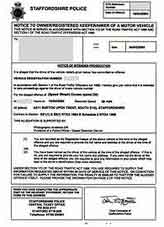
Q. Vehicle Defect Rectification Form
Q. Non-endorseable Fixed Penalty Notice
Q. Endorseable Fixed Penalty Notice
Q. Notice of Intended Prosecution


 |
|||||||
| Q. Hort\1 Q. Vehicle Defect Rectification Form Q. Non-endorseable Fixed Penalty Notice Q. Endorseable Fixed Penalty Notice Q. Notice of Intended Prosecution |
 |
||||||
|
A. Sometimes referred to as a 'producer', this is a small form designed to give the station enquiry officer all the information he/she requires to be able to accept your documents when you produce them for a police officer. You would be issued with one of these if you do not have your driving documents in your possession when required to produce them for an officer. You then have 7 days from midnight on the day of issue to produce them at any police station of your choice. This could be anywhere in mainland Britain. The form contains information on the make, type and registration number of your vehicle; your name and address; your date of birth; the location of the incident at which you were required to produce your documents; the reason for the production; whether you were accompanied in the vehicle; whether you were being supervised by a full licence holder; if you were displaying L-plates; if the vehicle is manual or automatic; the station at which you elect to produce your documents and the details of the officer making the requirement to produce. | ||||||
| A. This is often a carbon copy of the H.O.R.T.\1 form and is issued if you have committed an offence under the Construction and Use Regulations. These are offences in relation to the general condition of the vehicle, such as defective tyres, lights, number plates, windscreen wipers and dangerous parts etc. The form contains details of the offence and when issued with one of these you should rectify the defect to your vehicle as soon as possible and then ensure that the vehicle is taken to any M.O.T. testing station where the M.O.T. tester will check that the defect has been rectified. He\she will then stamp the form accordingly and it should be sent to the station at which the officer has noted at the bottom of the form within 14 days. You do not have 14 days to rectify the defect. If you continue to use the vehicle in a defective condition, you commit a further offence. The 14 days relates only to the form being stamped and then sent in. | |||||||
| A. A non-endorseable fixed penalty notice is issued in respect of minor traffic offences which do not carry penalty points. The fine is currently fixed at £30 which must be paid within 28 days. If it is not, then the fine automatically increases to £45 and if that's not paid then a summons is issued. Offences covered by this include seat belt offences, parking offences, many Construction and Use offences etc. The fine can be paid by cheque or postal order to an address written in red on the bottom of the form or can be paid over the telephone by using a credit card. | |||||||
| A. This is very similar in procedure to the non-endorseable notice but is issued in respect of offences which do carry penalty points such as speeding, dangerous parts etc. The fine is currently £60 and, if not paid, this increases to £90 before a summons is then issued. The rest of the procedure is the same with the added provision for the surrender of your driving licence for the penalty points to be endorsed upon it. This notice has a box included for the details of your driving licence and is filled out by the officer at the scene if you choose to surrender your licence there, or at the police station if you choose to produce it within 7 days. Your licence is then sent away and, while your licence is away, the notice acts as an official driving licence. If you wish to hire a vehicle, or if you need to produce your licence for a police officer, then this notice is what you produce. Your licence should be returned to you within about 3 /4 weeks but you should allow up to 3 months in case of delays. |  |
||||||
| A. A Notice of intended prosecution is a warning that should be given by the police following the commission of a number of offences, such as speeding and driving without due care and attention (but only when no accident has resulted from this latter charge or if the driver would be unlikely to know that an accident had occurred) and is intended to let a driver know that he has either been photographed committing one of these offences or that a complaint has been made so that he can refresh his memory of the incident. The warning can be given in either a verbal manner at the time of the incident, such as when you get stopped for speeding by a patrol officer, or within 14 days of the incident by post. This would be done in cases of GATSO speed detection or when a complaint is made by another motorist, for instance, of your manner of driving. This form must be issued within 14 days to the registered owner of the vehicle. It does not have to reach that person within 14 days and the recipient does not need to have been the driver at the time. | |||||||